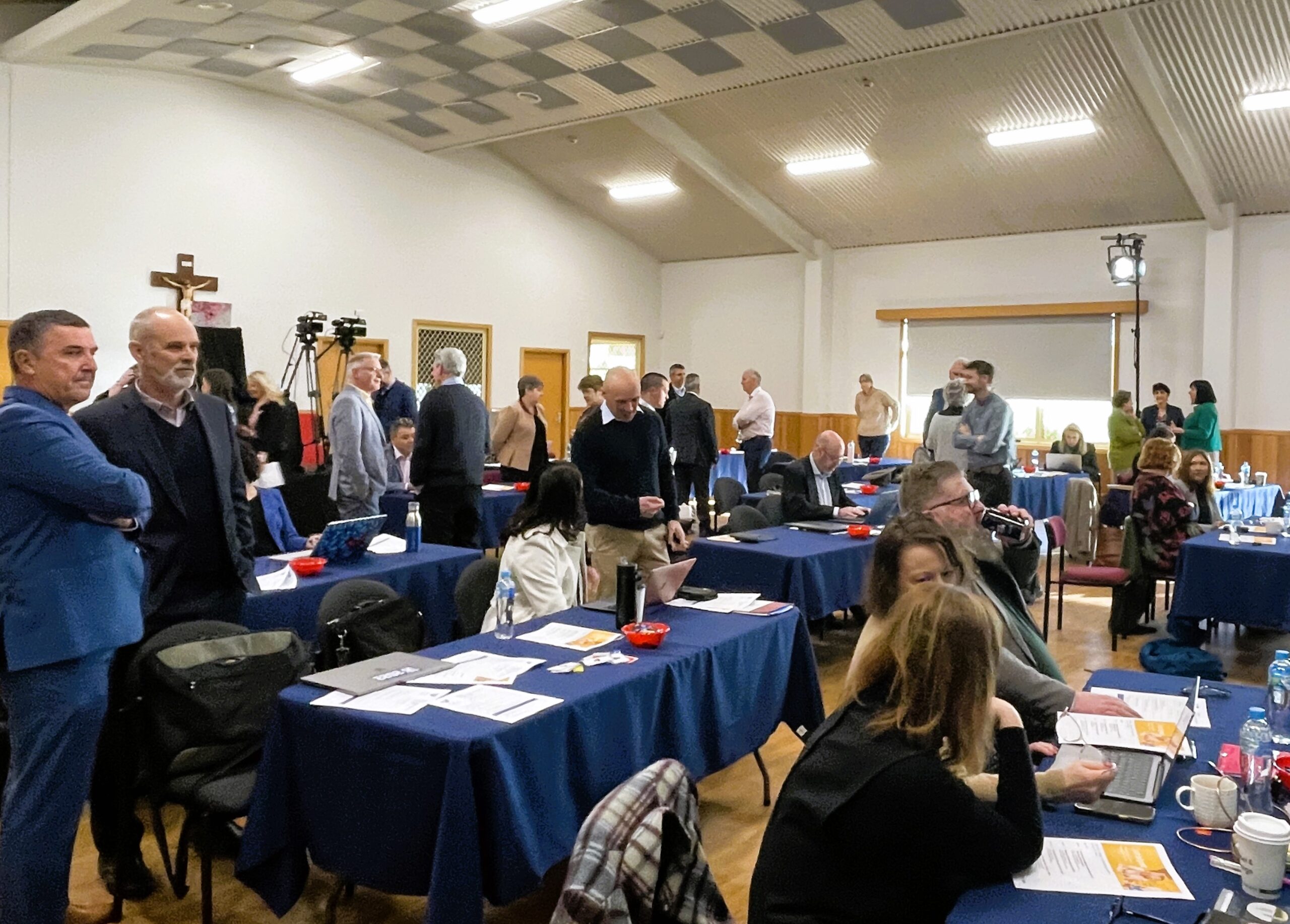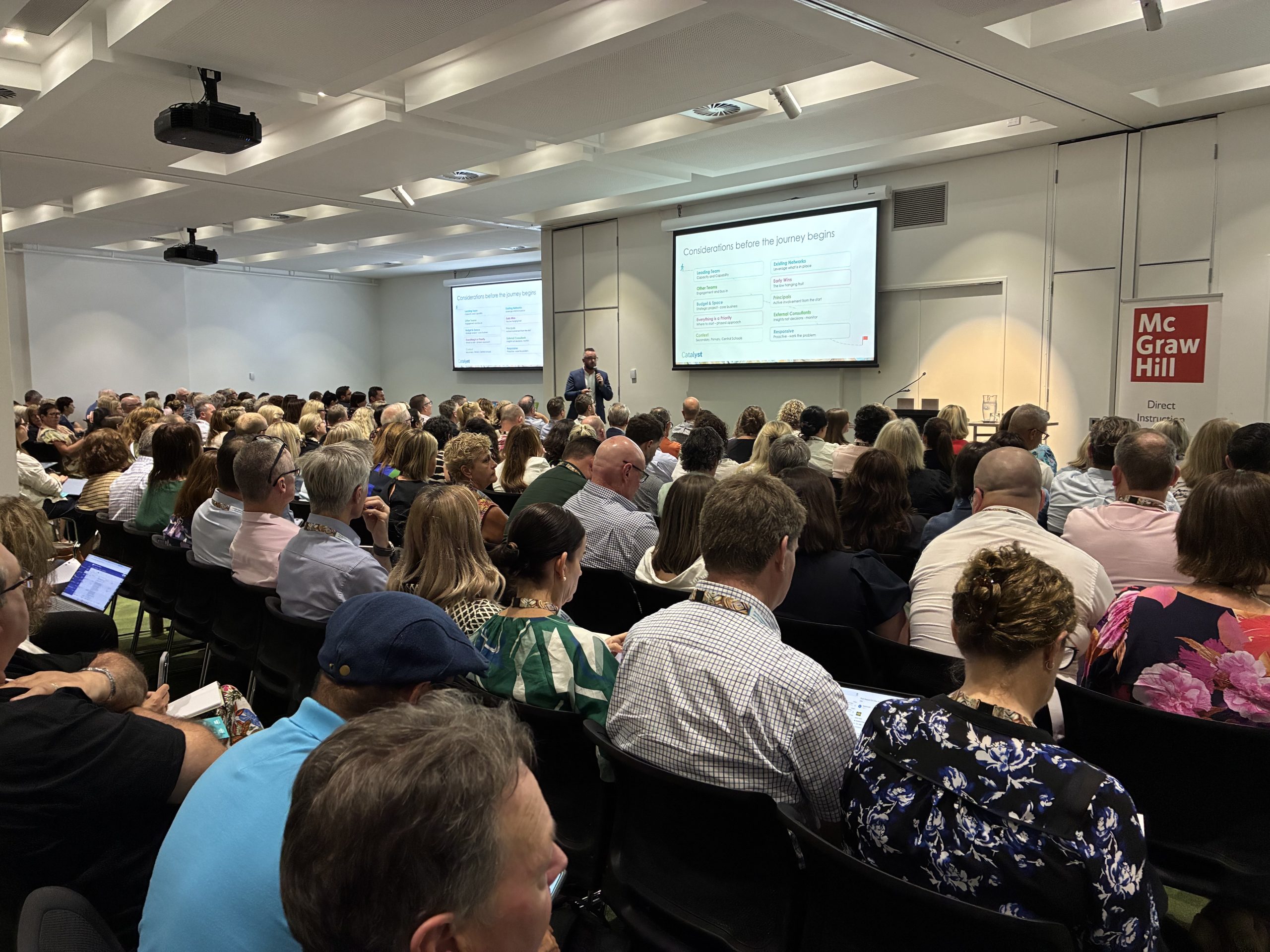Calm classrooms are enabling Trinity Catholic College, Goulburn to improve the learning experience for students.

Goulburn, NSW

651 Students

54 Teachers
Trinity Catholic College has always had a strong focus on student wellbeing. The relationship between learning and wellbeing is two-way for students, and Catalyst has helped the school to maintain this priority while refreshing teaching practices to align with the latest evidence.
Teachers reflect on the big ‘push’ for consistency at Trinity during 2024.
Catalyst is a Catholic Education Canberra Goulburn (CECG) program that offers schools world-class professional development and curriculum resources so that they can unlock each student’s full potential. In response, Trinity has put in place many important changes. This includes miniature whiteboards for students in every classroom – a strategy that keeps students engaged in lessons, and lets teachers see and respond in real-time if students are struggling. Even experienced teachers have found Catalyst has given them new ways to enhance their impact.
“I always used to think that students were consistently engaged in class, as I tend to teach…advanced Maths class, extension classes…It’s not until you actually use whiteboard activities [or others]…that you start to realise ‘Well, actually maybe not everyone’. [High Impact Teaching Practice] is actually something that’s worked and it’s really good…It is something that I’ll keep in place while I’m still teaching.” (Classroom teacher)
While Trinity already had a coaching program in place for new teachers, in 2024, they decided to expand this, so that all teachers could get frequent feedback from their peers. In addition, the school has been trialing booklets – an alternative to textbooks developed by Trinity teachers – across its junior classes. These two initiatives are focused on ensuring students get a similar learning experience, in terms of both quality and content. It also has additional benefits – when the Science faculty was faced with some staffing challenges during the year, new teachers were able to easily slot into the role and ensure learning continuity for students.
Trinity uses multiple CECG programs together to create the best possible learning
environment for students
In 2024, CECG has also been running a pilot of Classroom Mastery, a program that upskills staff with strategies for a positive and calm classroom culture, with clear routines and expectations. When this happens, students feel safe, have fewer distractions, and are more engaged. Trinity has been part of this pilot program, and staff are observing how their new practices are helping students settle faster into the lesson – creating more time for high impact teaching and student learning. School leaders also note fewer instances of disruptive student behaviour.
“All the classrooms in the school…have exactly the same routines, which helps not just with behaviour
but also helps students. [They] sit down and just lock in…and know what’s expected of them.”
(Classroom teacher)
Senior students particularly see the benefits, and want to understand their own
learning process
Both Catalyst and Classroom Mastery draw on evidence from the Science of Learning and ‘cognitive load theory’, which seeks to optimise students’ working memory to support learning. Catalyst is discussed with parents at information sessions – but also directly with students in the senior years. One leader explains why, and how students have positively responded, in the following quote.
“Daily Review [a teacher-led process of in-class revision] is an absolute game changer in terms of the High School Certificate. We explained it to the [year 11 and 12 students], and we actually talk about Catalyst. We talk about the Science of Learning, understanding what you’re doing, and cognitive load…
Through the lens of the Science of Learning, understanding how the brain works, we’re identifying for our young people what kind of stresses you can manipulate to be most successful in a learning environment and the ones that you can avoid…When we’re talking about Daily Review [and] revision of learning, we’re using all those skills to go back over what we’ve already done…we’re getting our brain to a point of being at ease with what we’re doing…
The Year 12s [also] really loved when we sat down with them and talked to them about why we wanted them to do Classroom Mastery. I went to a Year 12 assembly and I talked about the Science of what it looks like to be part of a cohesive learning model, and that you as a year 12, as a leader…set the tone for that calm environment. The buy-in was amazing. They genuinely want to understand how their brains work.“ (School leader)
Continuing to ‘sweat the small stuff’ where it matters
The work for the school in 2025 is to keep going with the good work commenced in 2024 – the Principal knows that teachers getting the details right is what leads to better student outcomes. This will include continuing to iterate on the booklets used by students, and progressing with the feedback and coaching process to help teachers continue to learn from their peers.
External Analysis delivered by

To measure the outcomes and impact of the Catalyst program, CECG engaged Deloitte Access Economics (DAE) for an external analysis. Starting in January 2022, DAE evaluated Catalyst’s effectiveness on schools. Their final report includes six case studies from diverse schools in the Archdiocese, highlighting academic achievements for students and advocacy impacts for teachers, along with areas for improvement.


